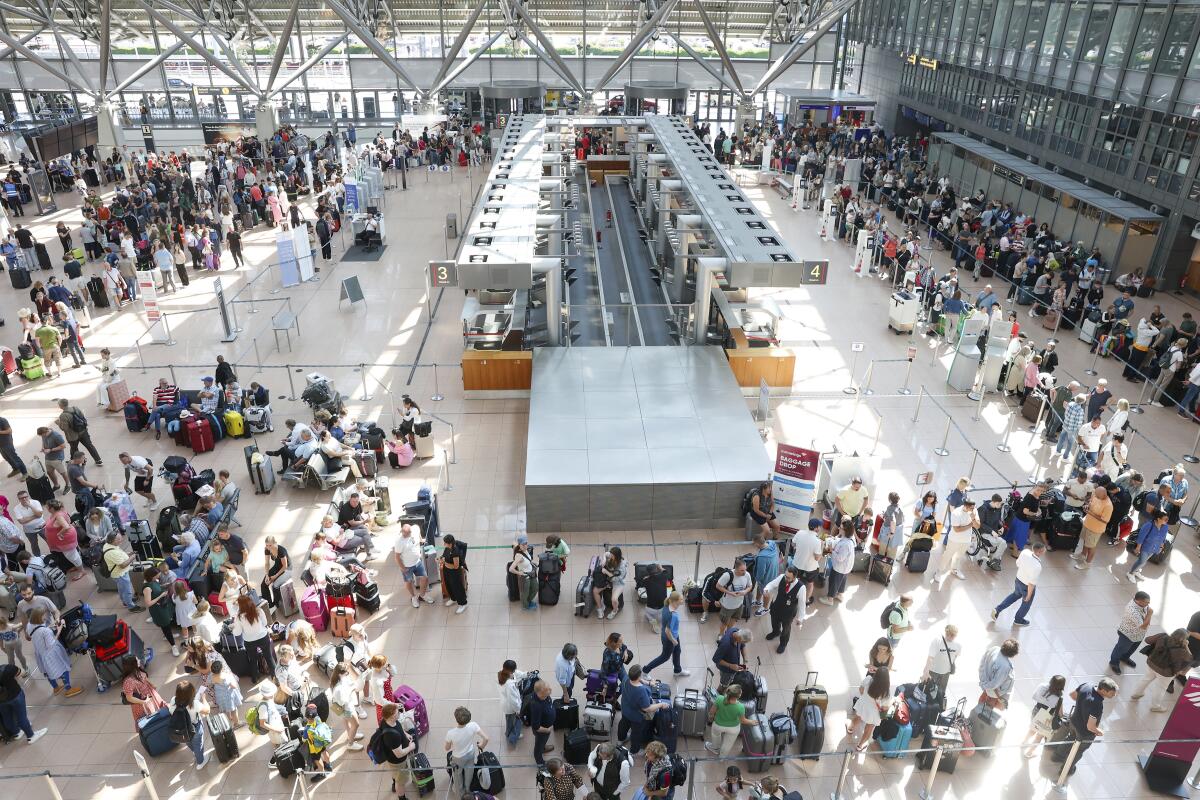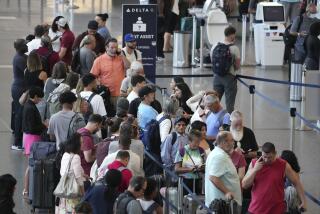A faulty software update causes havoc worldwide for airlines, hospitals and governments

FRANKFURT, Germany — A faulty software update caused technological havoc worldwide Friday, grounding flights, knocking down some financial companies and news outlets, and disrupting hospitals, small businesses and government offices.
The breadth of the outages highlighted the fragility of a digitized world dependent on just a few providers for key computing services.
The trouble was sparked by an update issued by cybersecurity firm CrowdStrike and affected its customers running Microsoft Windows, the world’s most popular operating system for personal computers. It was not the result of hacking or a cyberattack, according to CrowdStrike, which apologized and said a fix was on the way.
Businesses and governments worldwide experienced hours-long disruptions — their computer monitors glowing blue with error messages — and they scrambled to deal with the fallout. CrowdStrike’s chief executive said some of its systems will require time-consuming manual fixes.
Thousands of flights were canceled and tens of thousands were delayed, leading to long lines at airports in the U.S., Europe, Asia and Latin America. Airlines lost access to check-in and booking services in the heart of the summer travel season. By afternoon, the worst appeared to be over, though there were still lingering cancellations and delays because of the cascading effect of the disruption.
Several local TV stations in the U.S. were prevented from airing the news early Friday, and some state and local governments reported problems at courts, motor vehicles departments, unemployment agencies, emergency call centers and other offices, but as the day progressed many of the systems were getting back to normal.
Affected hospitals had problems with appointment systems, forcing them to suspend patient visits and cancel some surgeries.
Alison Baulos said her 73-year-old father’s heart surgery in Paducah, Ky., was canceled Friday morning because of the tech outage, leaving her family scared and worried.
“It does really make you just realize how much we rely on technology and how scary it is,” Baulos said in an interview. She said her father was waiting at Baptist Hospital to find out what will happen next. A phone message left with the hospital was not immediately returned.
American Express said it temporarily had some difficulties processing transactions, while TD Bank responded to online complaints by saying it was working to restore customers’ ability to access their accounts.
In New York City’s Times Square, right before 12:30 a.m., the blue “recovery” screens popping up on laptops appeared on several giant electronic billboards. A few were dark Friday afternoon.
A disturbing reminder of vulnerability
“This is a very, very uncomfortable illustration of the fragility of the world’s core internet infrastructure,” said Ciaran Martin, a professor at Oxford University’s Blavatnik School of Government and former Head of Britain’s National Cyber Security Center.
Cyber expert James Bore said real harm would be caused by the outage because systems we’ve come to rely on at crucial times are not going to be available. Hospitals, for example, will struggle to sort out appointments and those who need care may not get it — and it will lead to deaths, he said.
“All of these systems are running the same software,” Bore said. “We’ve made all of these tools so widespread that when things inevitably go wrong — and they will, as we’ve seen — they go wrong at a huge scale.”
The head of Germany’s IT security agency, Claudia Plattner, said that “the problems will last some time — we can’t expect a very quick solution.” A forecast for when exactly all systems will be up and running is difficult, but “it won’t be hours,” she added.
Microsoft spokesperson Frank X. Shaw confirmed in an emailed statement that “a CrowdStrike update was responsible for bringing down a number of Windows systems globally.” Earlier, the company had posted on the social media platform X that it was working to “alleviate impact” and that they were “observing a positive trend in service availability.”
During an interview on NBC’s “Today Show” Friday, CrowdStrike Chief Executive George Kurtz apologized for the outage, saying the company was “deeply sorry for the impact that we’ve caused to customers, to travelers, to anyone affected by this, including our companies.”
“We know what the issue is” and are working to remediate it, Kurtz said.
“It was only the Microsoft operating system” that was affected, though it didn’t happen on every Microsoft Windows system, he said.
The Austin, Texas, company’s shares fell 11.1% to $304.96 on Friday.
A recording playing on its customer service line said: “CrowdStrike is aware of the reports of crashes on Microsoft ports related to the Falcon sensor,” referring to one of its products used to block online attacks.
Airports in chaos, broadcasters go dark, surgeries delayed
Most airlines attributed the problems to their booking systems. Thousands of flights were affected in the U.S. alone, though by late morning, airlines said they were beginning to mitigate problems and resume some service. Unclogging the system takes time, though.
At Minneapolis-St. Paul International Airport, Sarah Schafer was delayed getting to her cousin’s 50th birthday party in Florida. She had been waiting for almost three hours with no indication of when her flight would be rebooked.
“I seem calm,” said Schafer, who was using a cane because of an ankle injury. “But my angry side might come out.”
Airlines and railways in Britain were also affected, with longer than usual waiting times. And airports across Europe suspended landings or halted takeoffs for several hours due to difficulties in checking in passengers.
Saskia Oettinghaus, a member of the German Olympic diving team, was among those stuck at the Berlin Airport.
“We are on our way to Paris for the Olympic Games and now we are at a standstill here for the time being,” Oettinghaus said.
Other athletes and spectators traveling to Paris were delayed, as were their uniforms and accreditations, but Games organizers said disruptions were limited and didn’t affect ticketing or the torch relay.
Broadcasters go dark, surgeries delayed
In Australia, national news outlets — including ABC and Sky News Australia — were unable to broadcast for hours. Some news anchors went on-air from dark offices, in front of computers showing blue error screens.
In the U.S., KSHB-TV in Kansas City, Mo., aired Scripps News instead of local news until about 5:35 a.m., the stations said on its website. Other local stations owned by Scripps reported similar problems, though Scripps spokesman Michael Perry said early Friday that 90% of stations were able to air local news.
Hospitals in several countries, including the U.S., reported problems.
Britain’s National Health Service said the outage caused problems at most doctors’ offices because appointment and patient-record systems were affected.
At Mass General Brigham, the largest healthcare system in Massachusetts, all scheduled non-urgent surgeries, procedures and medical visits were canceled Friday because of the outage, according to a spokesperson.
Some hospitals in northern Germany canceled all elective surgeries scheduled for Friday, but emergency care was unaffected.
Israel said its hospitals and post office operations were disrupted.
Charlotte Graham-McLay, Elaine Kurtenbach and David McHugh report for the Associated Press. Kurtenbach reported from Bangkok and Graham-McLay from Wellington, New Zealand. Associated Press journalists around the world contributed to this report.
More to Read
Sign up for Essential California
The most important California stories and recommendations in your inbox every morning.
You may occasionally receive promotional content from the Los Angeles Times.










